2023年外研版中考英语复习 第十二节 句子种类及简单句课件(共76张PPT)
文档属性
| 名称 | 2023年外研版中考英语复习 第十二节 句子种类及简单句课件(共76张PPT) |

|
|
| 格式 | pptx | ||
| 文件大小 | 1.0MB | ||
| 资源类型 | 教案 | ||
| 版本资源 | 外研版 | ||
| 科目 | 英语 | ||
| 更新时间 | 2023-06-03 12:03:11 | ||
图片预览

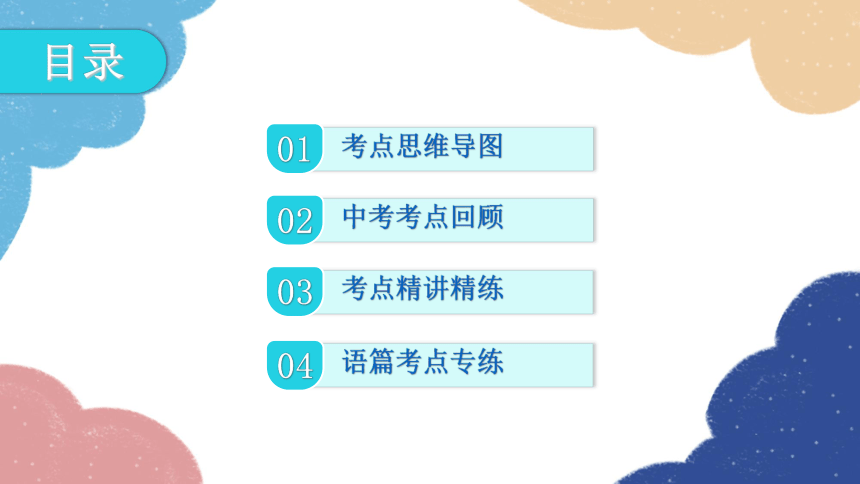
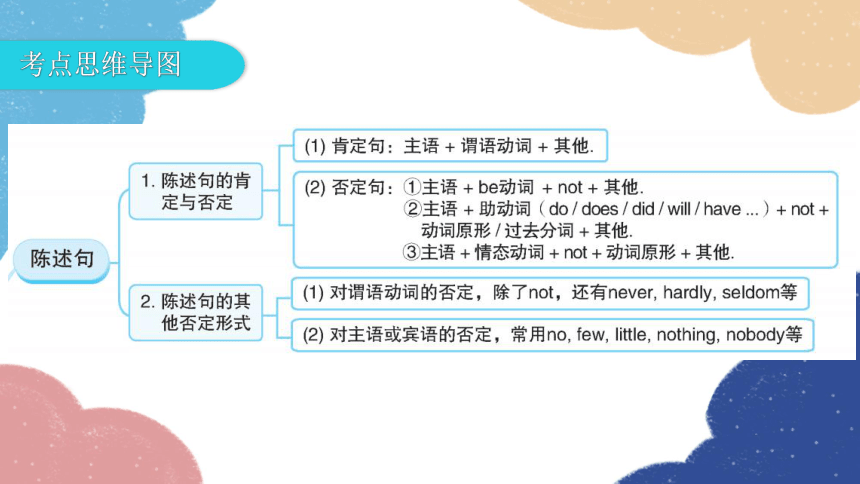
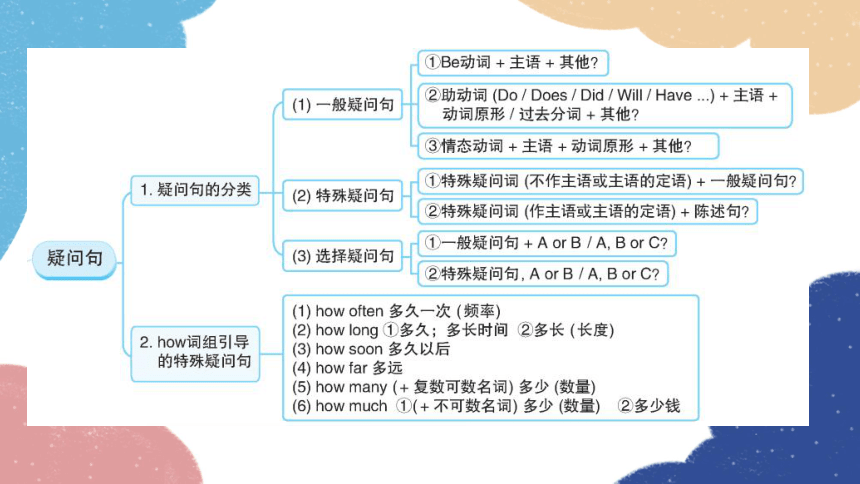
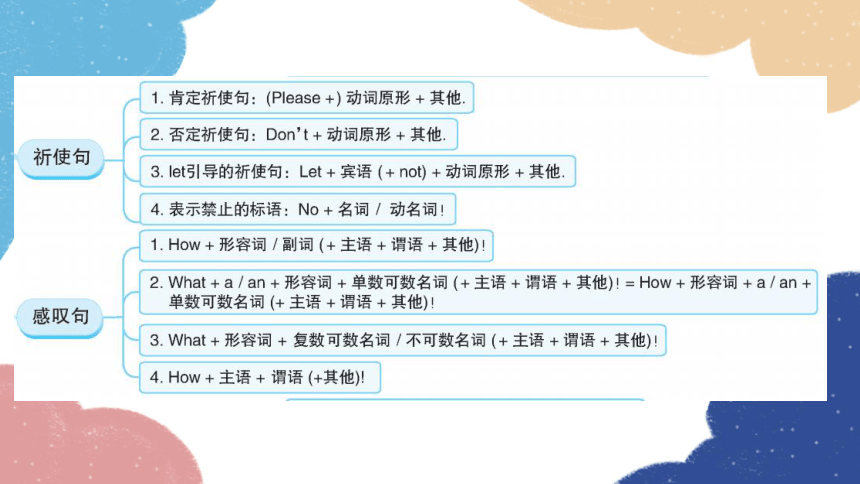
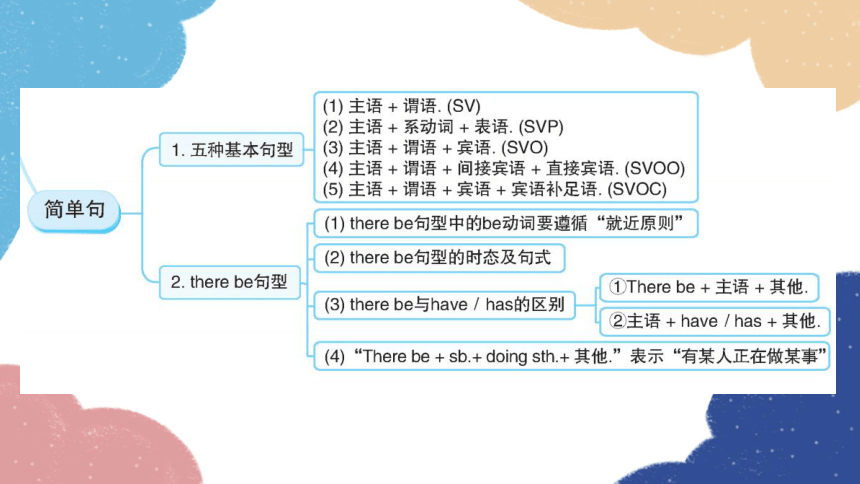
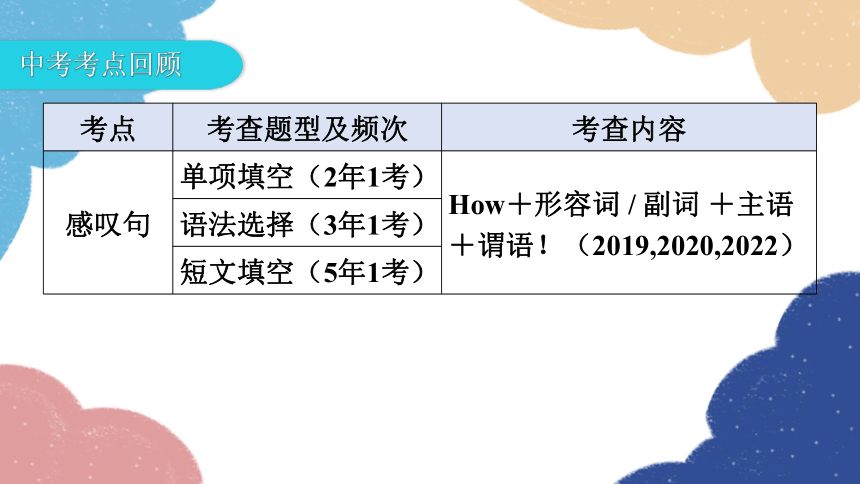
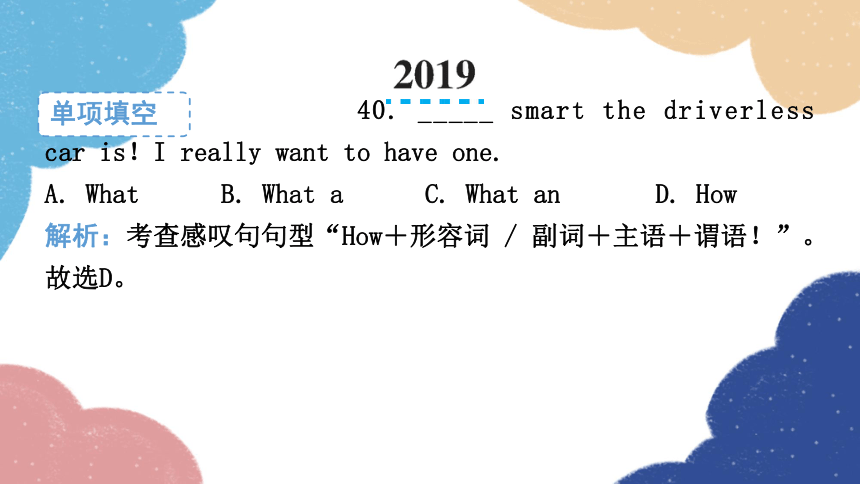
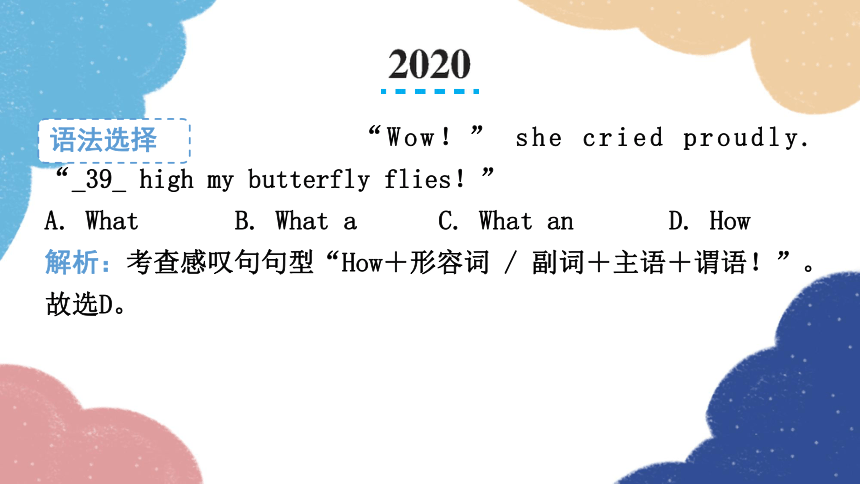
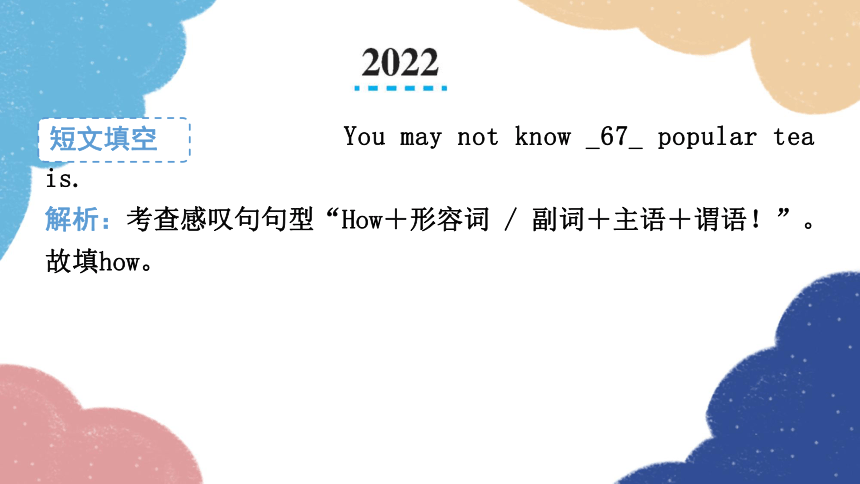

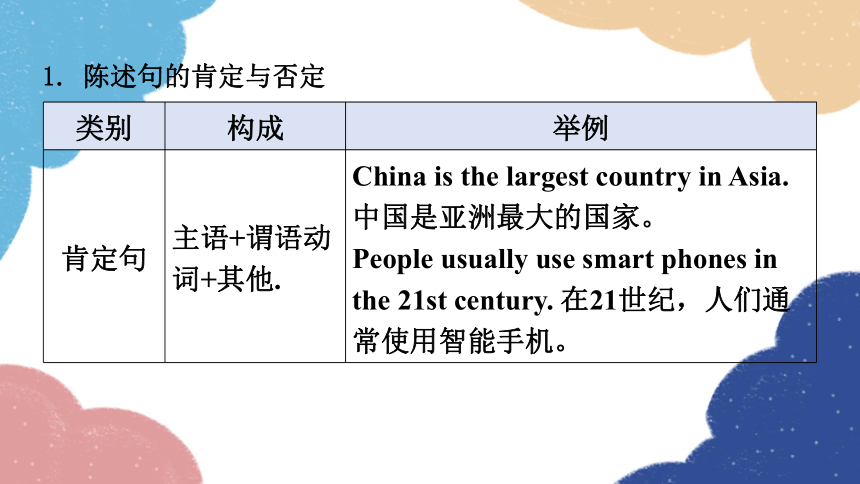
文档简介
(共76张PPT)
第一部分 基于语义的语法知识篇
句 法
第十二节 句子种类及简单句
目录
考点思维导图
01
中考考点回顾
02
考点精讲精练
03
语篇考点专练
04
考点思维导图
中考考点回顾
考点 考查题型及频次 考查内容
感叹句 单项填空(2年1考) How+形容词 / 副词 +主语+谓语!(2019,2020,2022)
语法选择(3年1考)
短文填空(5年1考)
40. _____ smart the driverless car is!I really want to have one.
A. What B. What a C. What an D. How
解析:考查感叹句句型“How+形容词 / 副词+主语+谓语!”。故选D。
单项填空
“Wow!” she cried proudly. “_39_ high my butterfly flies!”
A. What B. What a C. What an D. How
解析:考查感叹句句型“How+形容词 / 副词+主语+谓语!”。故选D。
语法选择
You may not know _67_ popular tea is.
解析:考查感叹句句型“How+形容词 / 副词+主语+谓语!”。故填how。
短文填空
考点精讲精练
考点1
陈述句
陈述句:用来陈述一个事实或阐述一个观点,分为肯定句和否定句。
1. 陈述句的肯定与否定
类别 构成 举例
肯定句 主语+谓语动词+其他. China is the largest country in Asia. 中国是亚洲最大的国家。
People usually use smart phones in the 21st century. 在21世纪,人们通常使用智能手机。
续表
类别 构成 举例
否定句 主语+be动词+not+其他. Japan is not the largest country in Asia. 日本不是亚洲最大的国家。
主语+助动词(do / does / did / will / have …)+not+动词原形 / 过去分词+其他. People don’t often use home phones now. 现在人们不常使用家庭电话。
续表
类别 构成 举例
否定句 主语+情态动词+not+动词原形+其他. You must not park here. 你不准在这里停车。
2. 陈述句的其他否定形式
(1)对谓语动词的否定,除了not,还可以用never, hardly, seldom等。
He never smokes. 他从不抽烟。
She ______ showed her feelings. 她很少表露情绪。
seldom
(2)对主语或宾语的否定,常用no, few, little, nothing, nobody等。
Few home buyers will notice this change. 很少购房者会注意到这个变化。
I can do _________ about it. 对此事我无能为力。
nothing
1. Michael shut the door after hearing the news. (改为否定句) (2022达州)
Michael ________ _______ the door after hearing the news.
2. I brush my teeth twice a day. (改为否定句) (2022重庆A卷)
I ________ ________ my teeth twice a day.
didn’t
shut
don’t
brush
3. I was doing my homework at seven last night. (改为否定句) (2022重庆B卷)
I ________ ________ my homework at seven last night.
4. —Have Tom and Jerry seen this movie before (补全否定回答) (2022天水)
—No, ________ ________.
wasn’t
doing
they
haven’t
5. Linda thinks it’s easy to write Chinese words. (改为否定句) (2021天水)
Linda ________ ________ it’s easy to write Chinese words.
doesn’t
think
疑问句:主要用来提出问题、询问情况。分为一般疑问句、特殊疑问句、选择疑问句和反意疑问句(高考语法项目)。
考点2
疑问句
1. 疑问句的分类
类别 构成 举例
一般疑问句 (用yes或no 回答) Be动词+主语+其他? —Was he afraid of the dark?他以前怕黑吗?
—Yes, he was. / No, he wasn’t. 是的,他怕。/ 不,他不怕。
续表
类别 构成 举例
一般疑问句 (用yes或no 回答) 助动词(Do / Does / Did / Will / Have …)+主语+动词原形 / 过去分词+其他? —Do you like English? 你喜欢英语吗?
—Yes, I do. / No, I don’t. 是的,我喜欢。/ 不,我不喜欢。
续表
类别 构成 举例
一般疑问句 (用yes或no 回答) 情态动词+主语+动词原形+其他? —Can you play the piano 你会弹钢琴吗?
—Yes,I can. / No,I can’t. 是的,我可以。/ 不,我不可以。
续表
类别 构成 举例
特殊疑问句 特殊疑问词(不作主语或主语的定语)+一般疑问句? Why do the young seldom go out to the shops now 为什么年轻人现在很少去商店?
特殊疑问词(作主语或主语的定语)+陈述句? Who can help me 谁能帮我?
续表
类别 构成 举例
选择疑问句 (不能用yes或no回答) 一般疑问句+A or B/A, B or C? —Is the girl with short hair from America or England 那个短发女生是来自美国还是英国?
—She’s from America. 她来自美国。
续表
类别 构成 举例
选择疑问句 (不能用yes或no回答) 特殊疑问句, A or B/A, B or C? —Which do you prefer, cartoons or comedies 卡通片和喜剧,你更喜欢哪个?
—Neither. I like documentaries. 两个都不喜欢。我喜欢纪录片。
2. how词组引导的特殊疑问句:根据句意及回答选择how词组
(1) how often多久一次(频率) 回答:never/every day/twice a month等
—How often does an earthquake happen here? 在这里,多久发生一次地震?
—Almost every year. 几乎每年都发生。
(2)how long
①多久;多长时间回答:for+一段时间/since+某个时间点 / since+一段时间+ago
—How long have you lived here?你在这里住多久了?
—For several months. 有几个月了。
②多长(长度) 回答:数词+长度单位
—How long is the Amazon River? 亚马孙河有多长?
—About 6,440 kilometers. 约6440千米。
(3)how soon多久以后 回答:in+一段时间
—How soon can you finish the work?你还要多久才能完成这项工作?
—In half an hour. 半小时后。
(4)how far 多远
回答①:数词+长度单位
—How far is it from Macao to Hong Kong?澳门距离香港多远?
—About 62 kilometers. 约62千米。
回答②:时间’s+walk/ride/drive/flight等
—How far is it from Dongguan to Shenzhen?东莞距离深圳多远?
—About one hour’s drive. 约1小时车程。
(5)how many (+复数可数名词) 多少(数量)
—How many days did you work this week?你这周上了几天班?
—Five days. 5天。
(6)how much
①(+不可数名词) 多少(数量)
—How much water do you need?你需要多少水?
—Three cups of water. 3杯水。
②多少钱
—How much is this phone? 这部手机多少钱?
—About 5,300 yuan. 约5300元。
( )1. —Tell me, Grandma. _____ is your favourite person in the whole wide world
—That’s easy! It’s you! (2022扬州改编)
A. Whose B. Who C. Whom
B
( )2. —_____ sports will you take part in, Peter
—The boys’ 800-meter race.
A. Where B. When C. Which
( )3. —_____ is it from the shopping mall to your home?
—It’s about 8 minutes’ drive.
A. How often B. How long C. How far
C
C
( )4. —Mary, _____ can we get to the theater?
—It’s hard to say. Maybe in about half an hour.
A. how long B. how often C. how soon
( )5. —_____ do Ronald’s parents let him play computer games
—Once a week.
A. How often B. How long C. How soon
C
A
祈使句:主要用来表示请求、命令、建议、禁止或祝愿等, 其主语you通常被省略, 谓语动词用原形。
1. 肯定祈使句:(Please+) 动词原形+其他.
Please stop at the red light!红灯时请停下来!
2. 否定祈使句:Don’t+动词原形+其他.
Don’t talk in class!在课堂上别说话!
考点3
祈使句
3. let引导的祈使句:Let+宾语 (+not)+动词原形+其他.
Let me hear what people are looking forward to. 让我听听人们在期盼什么。
Let him ________________ such words. 让他不要再重复这些话了。
not repeat
4. 表示禁止的标语:No+名词/动名词!
No litter!禁止扔垃圾!
No ___________!禁止停车!
parking
( )1. Hey, guy, can’t you see the sign over there? It says,“_____ Fishing!”
A. No B. Not C. Don’t
( )2. _____ more, and you’ll improve your spoken English.
A. To speak B. Speak C. Speaking
A
B
( )3. Boys and girls, _____ up your hands if you want to take part in the summer camp.
A. putting B. to put C. put
( )4. _____ swimming in the river alone! It’s dangerous.
A. Doesn’t go B. Don’t go C. Didn’t go
( )5. Let’s_____ so loudly. The baby is sleeping.
A. not to talk B. talk not C. not talk
C
B
C
感叹句:用来表达赞美、惊讶、喜悦或气愤等强烈的感情,句末常用“!”。
考点4
感叹句
构成 举例
How+形容词/副词 (+主语+谓语+其他)!(5年3考) How nice the weather is today!今天天气真好!
续表
构成 举例
What+a/an+形容词+单数可数名词 (+主语+谓语+其他)!=How+形容词+a / an+单数可数名词 (+主语+谓语+其他)! What a good day (we’ve had today)!=How good a day (we’ve had today)!(我们今天度过了)多么美好的一天啊!
续表
构成 举例
What+形容词+复数可数名词/不可数名词 (+主语+谓语+其他)! What beautiful clothes they are!这些衣服真漂亮!
What nice weather it is today!今天天气真好!
How+主语+谓语(+其他)! How I missed you! 我多么想念你啊!
( )1. —Gu Ailing achieved her dream and won two gold medals in Beijing 2022 Winter Olympics.
—_____ excellent girl! (2022达州改编)
A. What a B. How C. What an
C
( )2. —Maria, we will graduate in a week.
—_____time flies! We should keep in touch.
(2022铜仁改编)
A. What a B. What C. How
C
( )3. —Look! Jeff is helping a blind man cross the road.
—_____ helpful he is! We should learn from him. (2022郴州)
A. How B. What C. What a
A
( )4. —Shenzhou ⅩⅣ carried three Chinese astronauts into space successfully.
—Wow, _____ exciting news! We are so proud. (2022昆明改编)
A. what B. what a C. what an
A
( )5. —_____ beautiful poem Happy Rain on a Spring Night is!
—So it is! Du Fu showed his care for farmers in the poem. (2022海南)
A. How B. What a C. What
B
1. 简单句的五种基本句型
考点5
简单句
构成 举例
主语+谓语. (SV) 主语+谓语. (SV) The accident happened. 意外发生了。
S V
主语+系动词+表语. (SVP) Our classroom looks big. 我们的教室看起
S V P 来很大。
续表
构成 举例
主语+谓语+宾语. (SVO) (谓语为及物动词) The boy likes tennis. 这个男孩喜欢网球。
S V O
主语+谓语+间接宾语+直接宾语. (SVOO) (谓语为及物动词) Harry’s friend is passing him the ball.
S V O O
哈利的朋友正在传球给他。
续表
构成 举例
主语+谓语+宾语+宾语补足语. (SVOC) (谓语为及物动词) Technology will make our life better.
S V O C
科技会让我们的生活更美好。
判断下列句子的句型结构(SV / SVP / SVO / SVOO / SVOC)
(1)Tina gave me a nice Christmas gift. ______
(2)Jenny cleaned the classroom. ______
(3)We keep the classroom clean. ______
(4)The train is leaving. ______
(5)The kids are happy. ______
SVOO
SVO
SVOC
SV
SVP
2. there be 句型
(1) 遵循“就近原则”:there be 句型中的be动词应与其后最近的主语在数上保持一致。
There is a notebook and two pens on my desk. 我的书桌上有一本笔记本和两支钢笔。
There ______ two pens and a notebook on my desk. 我的书桌上有两支钢笔和一本笔记本。
are
(2) there be句型的时态及句式:
类别 一般现在时 一般过去时 一般将来时
肯定句 There is/are … There was/were … There will be …/
There is / are going to be …
否定句 There isn’t/ aren’t … There wasn’t/ weren’t … There won’t be …/
There isn’t / aren’t going to be …
续表
类别 一般现在时 一般过去时 一般将来时
一般疑 问句及 其回答 —Is/Are there … —Yes, there is/are. —No, there isn’t/aren’t. —Was/Were there … —Yes, there was/were. —No, there wasn’t/weren’t. —Will there be … / —Is / Are there going to be …
—Yes, there will be. /Yes, there is / are going to be.
—No, there won’t be. /No, there isn’t / aren’t going to be.
①________________ no letters yesterday. 昨天一封信也没有。
②_________________________ a chance for parents to look around the school. 家长将有机会参观学校。
③__________ enough room for us, let alone any guests. 连我们都没有足够的空间,更不用说客人了。
④__________ any other questions 还有其他问题吗?
There were
There will be / is going to be
There isn’t
Are there
(3) there be与have/has的区别:
①“There be+主语+其他. ”表示“某地存在某人、某物等”。
There is more room in first class. 头等舱更宽敞。
②“主语+have/has+其他. ”表示“(某人)拥有(某物)”。
You have beautiful eyes. 你有一双漂亮的眼睛。
(4)一个重要句型:表示“有某人正在做某事”,要用“There be+sb. +doing sth. +其他. ”。
There are several children swimming in the river. 有几个孩子正在河里游泳。
( )1. We hope _____ a computer on every student’s desk in the future. (2022天津改编)
A. there is B. there was C. there will be
C
( )2. —There _____ a basketball game against Class Two this Sunday.
— I see. I will come and cheer you on. (2021乐山)
A. will have B. is going to be C. is going to have
B
( )3. Look!There _____ any lemonade (柠檬水) left. Let’s make some now.
A. is B. isn’t C. aren’t
B
( )4. —_____ there any good news in today’s China Daily
—No, but there _____ some funny stories worth reading.
A. Is; is B. Are; are C. Is; are
C
( )5. —Was there a tall man in the meeting room just now
—_____. I didn’t see anyone there.
A. Yes, there was B. No, there wasn’t
C. No, it wasn’t
B
语篇考点专练
一、语法选择
Last August we went to a waterfall. There _1_ a number of people playing in the water.
Sitting on the rocks,I was watching some parents nervously _2_ their kids away from the rocks’ edges(边缘) with my husband. I felt glad that our 8-year-old son Wyatt could look after himself. “_3_ running,”I said to
were
guarding
No
him from time to time. “_4_ away from the edges. ”But I soon relaxed, and we were all having fun in the water.
Suddenly,I saw Wyatt sit down between two rocks in the running water. Then he disappeared over the edge.
“Help, please!”I cried, over and over. But I only heard a husband said to his wife, “We are leaving!”
Stay
“Please _5_ go!” I begged(乞求). But they walked straight away.
When I climbed down to the rocks,there was a young woman _6_ my husband pull Wyatt out of the water. She was giving first aid. “I’m Lisa,a nurse. I’m _7_ leaving you. ” “_8_ warmhearted lady you are!” I couldn’t help crying. Not only I but also my husband was thankful to Lisa.
don’t
helping
not
What a
Wyatt was taken to the hospital immediately. The next 8 hours was a sleepless night for us. Then we were told Wyatt was going to be OK. “_9_ can he leave for home, doctor?” I asked. “In 2 days. ”
Meeting Lisa has reminded me _10_ we need help from people we don’t know!
How soon
How
( )1. A. was B. were C. are
( )2. A. guarded B. to guard C. guarding
( )3. A. Don’t B. Not C. No
( )4. A. Stayed B. Stay C. Staying
( )5. A. don’t B. doesn’t C. didn’t
B
C
C
B
A
( )6. A. helping B. help C. helped
( )7. A. no B. not C. don’t
( )8. A. How B. What C. What a
( )9. A. How long B. How soon C. How far
( )10. A. How B. How a C. What
A
B
C
B
A
二、短文填空
These days, people have very busy lives, working or studying and spending time with friends and family. _1_ stressful the life is today! So people need to do something different to relax in _2_ free time.
Some people like to go to the gym so that they can _3_ fit and healthy. _4_, many people don’t like running
How
their
keep / be
However
or using machines to exercise. Then yoga(瑜伽)can _5_ a good activity for these people.
In yoga you can reach out your body and breathe deeply at the _6_ time. This helps your body and mind to _7_ while your body becomes stronger. Many people do yoga every day, and it is _8_ activity which all types of people can do—young or old. It can give you more energy, too.
be
an
same
relax
Yoga started a very long time ago _9_ India, but in the last few years it has become very popular all over the world. You can find yoga classes in most towns and cities these days. There are also lots of yoga videos on the Internet, so you can try it at home! If you want to exercise and relax at the same time, _10_ don’t you try yoga (2022自贡改编)
in
why
1. ________________ 2. ________________
3. ________________ 4. ________________
5. ________________ 6. ________________
7. ________________ 8. ________________
9. ________________ 10. ________________
be
How
an
their
keep / be
However
same
relax
in
why
THANKS!
第一部分 基于语义的语法知识篇
句 法
第十二节 句子种类及简单句
目录
考点思维导图
01
中考考点回顾
02
考点精讲精练
03
语篇考点专练
04
考点思维导图
中考考点回顾
考点 考查题型及频次 考查内容
感叹句 单项填空(2年1考) How+形容词 / 副词 +主语+谓语!(2019,2020,2022)
语法选择(3年1考)
短文填空(5年1考)
40. _____ smart the driverless car is!I really want to have one.
A. What B. What a C. What an D. How
解析:考查感叹句句型“How+形容词 / 副词+主语+谓语!”。故选D。
单项填空
“Wow!” she cried proudly. “_39_ high my butterfly flies!”
A. What B. What a C. What an D. How
解析:考查感叹句句型“How+形容词 / 副词+主语+谓语!”。故选D。
语法选择
You may not know _67_ popular tea is.
解析:考查感叹句句型“How+形容词 / 副词+主语+谓语!”。故填how。
短文填空
考点精讲精练
考点1
陈述句
陈述句:用来陈述一个事实或阐述一个观点,分为肯定句和否定句。
1. 陈述句的肯定与否定
类别 构成 举例
肯定句 主语+谓语动词+其他. China is the largest country in Asia. 中国是亚洲最大的国家。
People usually use smart phones in the 21st century. 在21世纪,人们通常使用智能手机。
续表
类别 构成 举例
否定句 主语+be动词+not+其他. Japan is not the largest country in Asia. 日本不是亚洲最大的国家。
主语+助动词(do / does / did / will / have …)+not+动词原形 / 过去分词+其他. People don’t often use home phones now. 现在人们不常使用家庭电话。
续表
类别 构成 举例
否定句 主语+情态动词+not+动词原形+其他. You must not park here. 你不准在这里停车。
2. 陈述句的其他否定形式
(1)对谓语动词的否定,除了not,还可以用never, hardly, seldom等。
He never smokes. 他从不抽烟。
She ______ showed her feelings. 她很少表露情绪。
seldom
(2)对主语或宾语的否定,常用no, few, little, nothing, nobody等。
Few home buyers will notice this change. 很少购房者会注意到这个变化。
I can do _________ about it. 对此事我无能为力。
nothing
1. Michael shut the door after hearing the news. (改为否定句) (2022达州)
Michael ________ _______ the door after hearing the news.
2. I brush my teeth twice a day. (改为否定句) (2022重庆A卷)
I ________ ________ my teeth twice a day.
didn’t
shut
don’t
brush
3. I was doing my homework at seven last night. (改为否定句) (2022重庆B卷)
I ________ ________ my homework at seven last night.
4. —Have Tom and Jerry seen this movie before (补全否定回答) (2022天水)
—No, ________ ________.
wasn’t
doing
they
haven’t
5. Linda thinks it’s easy to write Chinese words. (改为否定句) (2021天水)
Linda ________ ________ it’s easy to write Chinese words.
doesn’t
think
疑问句:主要用来提出问题、询问情况。分为一般疑问句、特殊疑问句、选择疑问句和反意疑问句(高考语法项目)。
考点2
疑问句
1. 疑问句的分类
类别 构成 举例
一般疑问句 (用yes或no 回答) Be动词+主语+其他? —Was he afraid of the dark?他以前怕黑吗?
—Yes, he was. / No, he wasn’t. 是的,他怕。/ 不,他不怕。
续表
类别 构成 举例
一般疑问句 (用yes或no 回答) 助动词(Do / Does / Did / Will / Have …)+主语+动词原形 / 过去分词+其他? —Do you like English? 你喜欢英语吗?
—Yes, I do. / No, I don’t. 是的,我喜欢。/ 不,我不喜欢。
续表
类别 构成 举例
一般疑问句 (用yes或no 回答) 情态动词+主语+动词原形+其他? —Can you play the piano 你会弹钢琴吗?
—Yes,I can. / No,I can’t. 是的,我可以。/ 不,我不可以。
续表
类别 构成 举例
特殊疑问句 特殊疑问词(不作主语或主语的定语)+一般疑问句? Why do the young seldom go out to the shops now 为什么年轻人现在很少去商店?
特殊疑问词(作主语或主语的定语)+陈述句? Who can help me 谁能帮我?
续表
类别 构成 举例
选择疑问句 (不能用yes或no回答) 一般疑问句+A or B/A, B or C? —Is the girl with short hair from America or England 那个短发女生是来自美国还是英国?
—She’s from America. 她来自美国。
续表
类别 构成 举例
选择疑问句 (不能用yes或no回答) 特殊疑问句, A or B/A, B or C? —Which do you prefer, cartoons or comedies 卡通片和喜剧,你更喜欢哪个?
—Neither. I like documentaries. 两个都不喜欢。我喜欢纪录片。
2. how词组引导的特殊疑问句:根据句意及回答选择how词组
(1) how often多久一次(频率) 回答:never/every day/twice a month等
—How often does an earthquake happen here? 在这里,多久发生一次地震?
—Almost every year. 几乎每年都发生。
(2)how long
①多久;多长时间回答:for+一段时间/since+某个时间点 / since+一段时间+ago
—How long have you lived here?你在这里住多久了?
—For several months. 有几个月了。
②多长(长度) 回答:数词+长度单位
—How long is the Amazon River? 亚马孙河有多长?
—About 6,440 kilometers. 约6440千米。
(3)how soon多久以后 回答:in+一段时间
—How soon can you finish the work?你还要多久才能完成这项工作?
—In half an hour. 半小时后。
(4)how far 多远
回答①:数词+长度单位
—How far is it from Macao to Hong Kong?澳门距离香港多远?
—About 62 kilometers. 约62千米。
回答②:时间’s+walk/ride/drive/flight等
—How far is it from Dongguan to Shenzhen?东莞距离深圳多远?
—About one hour’s drive. 约1小时车程。
(5)how many (+复数可数名词) 多少(数量)
—How many days did you work this week?你这周上了几天班?
—Five days. 5天。
(6)how much
①(+不可数名词) 多少(数量)
—How much water do you need?你需要多少水?
—Three cups of water. 3杯水。
②多少钱
—How much is this phone? 这部手机多少钱?
—About 5,300 yuan. 约5300元。
( )1. —Tell me, Grandma. _____ is your favourite person in the whole wide world
—That’s easy! It’s you! (2022扬州改编)
A. Whose B. Who C. Whom
B
( )2. —_____ sports will you take part in, Peter
—The boys’ 800-meter race.
A. Where B. When C. Which
( )3. —_____ is it from the shopping mall to your home?
—It’s about 8 minutes’ drive.
A. How often B. How long C. How far
C
C
( )4. —Mary, _____ can we get to the theater?
—It’s hard to say. Maybe in about half an hour.
A. how long B. how often C. how soon
( )5. —_____ do Ronald’s parents let him play computer games
—Once a week.
A. How often B. How long C. How soon
C
A
祈使句:主要用来表示请求、命令、建议、禁止或祝愿等, 其主语you通常被省略, 谓语动词用原形。
1. 肯定祈使句:(Please+) 动词原形+其他.
Please stop at the red light!红灯时请停下来!
2. 否定祈使句:Don’t+动词原形+其他.
Don’t talk in class!在课堂上别说话!
考点3
祈使句
3. let引导的祈使句:Let+宾语 (+not)+动词原形+其他.
Let me hear what people are looking forward to. 让我听听人们在期盼什么。
Let him ________________ such words. 让他不要再重复这些话了。
not repeat
4. 表示禁止的标语:No+名词/动名词!
No litter!禁止扔垃圾!
No ___________!禁止停车!
parking
( )1. Hey, guy, can’t you see the sign over there? It says,“_____ Fishing!”
A. No B. Not C. Don’t
( )2. _____ more, and you’ll improve your spoken English.
A. To speak B. Speak C. Speaking
A
B
( )3. Boys and girls, _____ up your hands if you want to take part in the summer camp.
A. putting B. to put C. put
( )4. _____ swimming in the river alone! It’s dangerous.
A. Doesn’t go B. Don’t go C. Didn’t go
( )5. Let’s_____ so loudly. The baby is sleeping.
A. not to talk B. talk not C. not talk
C
B
C
感叹句:用来表达赞美、惊讶、喜悦或气愤等强烈的感情,句末常用“!”。
考点4
感叹句
构成 举例
How+形容词/副词 (+主语+谓语+其他)!(5年3考) How nice the weather is today!今天天气真好!
续表
构成 举例
What+a/an+形容词+单数可数名词 (+主语+谓语+其他)!=How+形容词+a / an+单数可数名词 (+主语+谓语+其他)! What a good day (we’ve had today)!=How good a day (we’ve had today)!(我们今天度过了)多么美好的一天啊!
续表
构成 举例
What+形容词+复数可数名词/不可数名词 (+主语+谓语+其他)! What beautiful clothes they are!这些衣服真漂亮!
What nice weather it is today!今天天气真好!
How+主语+谓语(+其他)! How I missed you! 我多么想念你啊!
( )1. —Gu Ailing achieved her dream and won two gold medals in Beijing 2022 Winter Olympics.
—_____ excellent girl! (2022达州改编)
A. What a B. How C. What an
C
( )2. —Maria, we will graduate in a week.
—_____time flies! We should keep in touch.
(2022铜仁改编)
A. What a B. What C. How
C
( )3. —Look! Jeff is helping a blind man cross the road.
—_____ helpful he is! We should learn from him. (2022郴州)
A. How B. What C. What a
A
( )4. —Shenzhou ⅩⅣ carried three Chinese astronauts into space successfully.
—Wow, _____ exciting news! We are so proud. (2022昆明改编)
A. what B. what a C. what an
A
( )5. —_____ beautiful poem Happy Rain on a Spring Night is!
—So it is! Du Fu showed his care for farmers in the poem. (2022海南)
A. How B. What a C. What
B
1. 简单句的五种基本句型
考点5
简单句
构成 举例
主语+谓语. (SV) 主语+谓语. (SV) The accident happened. 意外发生了。
S V
主语+系动词+表语. (SVP) Our classroom looks big. 我们的教室看起
S V P 来很大。
续表
构成 举例
主语+谓语+宾语. (SVO) (谓语为及物动词) The boy likes tennis. 这个男孩喜欢网球。
S V O
主语+谓语+间接宾语+直接宾语. (SVOO) (谓语为及物动词) Harry’s friend is passing him the ball.
S V O O
哈利的朋友正在传球给他。
续表
构成 举例
主语+谓语+宾语+宾语补足语. (SVOC) (谓语为及物动词) Technology will make our life better.
S V O C
科技会让我们的生活更美好。
判断下列句子的句型结构(SV / SVP / SVO / SVOO / SVOC)
(1)Tina gave me a nice Christmas gift. ______
(2)Jenny cleaned the classroom. ______
(3)We keep the classroom clean. ______
(4)The train is leaving. ______
(5)The kids are happy. ______
SVOO
SVO
SVOC
SV
SVP
2. there be 句型
(1) 遵循“就近原则”:there be 句型中的be动词应与其后最近的主语在数上保持一致。
There is a notebook and two pens on my desk. 我的书桌上有一本笔记本和两支钢笔。
There ______ two pens and a notebook on my desk. 我的书桌上有两支钢笔和一本笔记本。
are
(2) there be句型的时态及句式:
类别 一般现在时 一般过去时 一般将来时
肯定句 There is/are … There was/were … There will be …/
There is / are going to be …
否定句 There isn’t/ aren’t … There wasn’t/ weren’t … There won’t be …/
There isn’t / aren’t going to be …
续表
类别 一般现在时 一般过去时 一般将来时
一般疑 问句及 其回答 —Is/Are there … —Yes, there is/are. —No, there isn’t/aren’t. —Was/Were there … —Yes, there was/were. —No, there wasn’t/weren’t. —Will there be … / —Is / Are there going to be …
—Yes, there will be. /Yes, there is / are going to be.
—No, there won’t be. /No, there isn’t / aren’t going to be.
①________________ no letters yesterday. 昨天一封信也没有。
②_________________________ a chance for parents to look around the school. 家长将有机会参观学校。
③__________ enough room for us, let alone any guests. 连我们都没有足够的空间,更不用说客人了。
④__________ any other questions 还有其他问题吗?
There were
There will be / is going to be
There isn’t
Are there
(3) there be与have/has的区别:
①“There be+主语+其他. ”表示“某地存在某人、某物等”。
There is more room in first class. 头等舱更宽敞。
②“主语+have/has+其他. ”表示“(某人)拥有(某物)”。
You have beautiful eyes. 你有一双漂亮的眼睛。
(4)一个重要句型:表示“有某人正在做某事”,要用“There be+sb. +doing sth. +其他. ”。
There are several children swimming in the river. 有几个孩子正在河里游泳。
( )1. We hope _____ a computer on every student’s desk in the future. (2022天津改编)
A. there is B. there was C. there will be
C
( )2. —There _____ a basketball game against Class Two this Sunday.
— I see. I will come and cheer you on. (2021乐山)
A. will have B. is going to be C. is going to have
B
( )3. Look!There _____ any lemonade (柠檬水) left. Let’s make some now.
A. is B. isn’t C. aren’t
B
( )4. —_____ there any good news in today’s China Daily
—No, but there _____ some funny stories worth reading.
A. Is; is B. Are; are C. Is; are
C
( )5. —Was there a tall man in the meeting room just now
—_____. I didn’t see anyone there.
A. Yes, there was B. No, there wasn’t
C. No, it wasn’t
B
语篇考点专练
一、语法选择
Last August we went to a waterfall. There _1_ a number of people playing in the water.
Sitting on the rocks,I was watching some parents nervously _2_ their kids away from the rocks’ edges(边缘) with my husband. I felt glad that our 8-year-old son Wyatt could look after himself. “_3_ running,”I said to
were
guarding
No
him from time to time. “_4_ away from the edges. ”But I soon relaxed, and we were all having fun in the water.
Suddenly,I saw Wyatt sit down between two rocks in the running water. Then he disappeared over the edge.
“Help, please!”I cried, over and over. But I only heard a husband said to his wife, “We are leaving!”
Stay
“Please _5_ go!” I begged(乞求). But they walked straight away.
When I climbed down to the rocks,there was a young woman _6_ my husband pull Wyatt out of the water. She was giving first aid. “I’m Lisa,a nurse. I’m _7_ leaving you. ” “_8_ warmhearted lady you are!” I couldn’t help crying. Not only I but also my husband was thankful to Lisa.
don’t
helping
not
What a
Wyatt was taken to the hospital immediately. The next 8 hours was a sleepless night for us. Then we were told Wyatt was going to be OK. “_9_ can he leave for home, doctor?” I asked. “In 2 days. ”
Meeting Lisa has reminded me _10_ we need help from people we don’t know!
How soon
How
( )1. A. was B. were C. are
( )2. A. guarded B. to guard C. guarding
( )3. A. Don’t B. Not C. No
( )4. A. Stayed B. Stay C. Staying
( )5. A. don’t B. doesn’t C. didn’t
B
C
C
B
A
( )6. A. helping B. help C. helped
( )7. A. no B. not C. don’t
( )8. A. How B. What C. What a
( )9. A. How long B. How soon C. How far
( )10. A. How B. How a C. What
A
B
C
B
A
二、短文填空
These days, people have very busy lives, working or studying and spending time with friends and family. _1_ stressful the life is today! So people need to do something different to relax in _2_ free time.
Some people like to go to the gym so that they can _3_ fit and healthy. _4_, many people don’t like running
How
their
keep / be
However
or using machines to exercise. Then yoga(瑜伽)can _5_ a good activity for these people.
In yoga you can reach out your body and breathe deeply at the _6_ time. This helps your body and mind to _7_ while your body becomes stronger. Many people do yoga every day, and it is _8_ activity which all types of people can do—young or old. It can give you more energy, too.
be
an
same
relax
Yoga started a very long time ago _9_ India, but in the last few years it has become very popular all over the world. You can find yoga classes in most towns and cities these days. There are also lots of yoga videos on the Internet, so you can try it at home! If you want to exercise and relax at the same time, _10_ don’t you try yoga (2022自贡改编)
in
why
1. ________________ 2. ________________
3. ________________ 4. ________________
5. ________________ 6. ________________
7. ________________ 8. ________________
9. ________________ 10. ________________
be
How
an
their
keep / be
However
same
relax
in
why
THANKS!
同课章节目录
- 词法
- 名词
- 动词和动词短语
- 动词语态
- 动词时态
- 助动词和情态动词
- 非谓语动词
- 冠词
- 代词
- 数词和量词
- 形容词副词及其比较等级
- 介词和介词短语
- 连词和感叹词
- 构词法
- 相似、相近词比较
- 句法
- 陈述句
- 一般疑问句和否定疑问句
- 特殊疑问句及选择疑问句
- 反意疑问句
- 存在句(There be句型)
- 宾语从句
- 定语从句
- 状语从句
- 主谓一致问题
- 简单句
- 并列句
- 复合句
- 主谓一致
- 主、表语从句
- 名词性从句
- 直接引语和间接引语
- 虚拟语气
- 感叹句
- 强调句
- 倒装句
- 祈使句
- 句子的成分
- 句子的分类
- 题型专区
- 单项选择部分
- 易错题
- 完形填空
- 阅读理解
- 词汇练习
- 听说训练
- 句型转换
- 补全对话
- 短文改错
- 翻译
- 书面表达
- 任务型阅读
- 语法填空
- 其他资料
